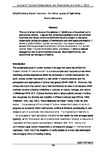(Re)thinking Maori tourism: the third space of hybridity
| dc.contributor.author | Amoamo, M. | |
| dc.date.accessioned | 2018-06-22T09:15:00Z | |
| dc.date.accessioned | 2018-06-22T12:06:14Z | |
| dc.date.available | 2018-06-22T09:15:00Z | |
| dc.date.available | 2018-06-22T12:06:14Z | |
| dc.date.issued | 2014 | |
| dc.identifier.citation |
Amoamo, M. (2014) '(Re)thinking Maori tourism: the third space of hybridity', Journal of Tourism Consumption and Practice, 6(1), p.128-135 | en_US |
| dc.identifier.issn | 1757-031X | |
| dc.identifier.uri | http://hdl.handle.net/10026.1/11730 | |
| dc.description.abstract |
This commentary reflects on the salience of hybridity as a theoretical tool in postcolonial studies. It argues that embedded paradigms such as colonised /coloniser and binary constructs Self/Other become subject to disruptive conjuncture through processes of hybridization and third space enunciation. It seeks to (re)think Māori Tourism as residing in third space inbetween spaces”and renegotiates the articulation of cultural production in a tourism context. Māori Tourism is therefore better understood in terms of cultural engagement that is performatively produced, historically informed, and transformed as new signs of identity. | en_US |
| dc.language.iso | en | en_US |
| dc.publisher | University of Plymouth | |
| dc.rights | Attribution-NonCommercial-NoDerivs 3.0 United States | * |
| dc.rights.uri | http://creativecommons.org/licenses/by-nc-nd/3.0/us/ | * |
| dc.title | (Re)thinking Maori tourism: the third space of hybridity | en_US |
| dc.type | Article | |
| plymouth.issue | 1 | |
| plymouth.volume | 6 | |
| plymouth.journal | Journal of Tourism Consumption and Practice |



